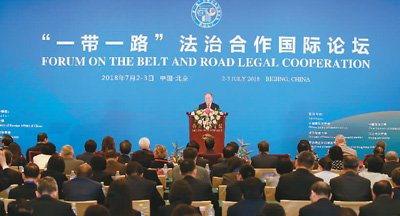By Wang Hailin from People’s Daily
China will deepen legal cooperation with countries and regions along the Belt and Road. Rules and the rule of law provide the green light for the Belt and Road to go global, as well as the safety valve to cope with risks and challenges. We need to promote infrastructure connectivity and step up synergy of rules and standards under the Belt and Road Initiative. State Councilor and Foreign Minister Wang Yi said on Monday.
Wang made the remarks while delivering a speech at the opening ceremony of the Forum on the Belt and Road Legal Cooperation.
Wang also called on countries involved in the Belt and Road initiative to establish a disputes settlement system and service mechanism including arbitration and mediation to deal with disputes in the initiative. The Ministry of Foreign Affairs is working on setting up a database of treaties and agreements, so that firms and the general public of the Belt and Road countries have access to them, Wang said.
The Forum on Belt and Road Legal Cooperation cosponsored by the Chinese Foreign Ministry and the China Law Society was just concluded Tuesday. Delegates from governments, international and regional organizations, the private sector and academic institutions attended the meeting.
The Forum on the Belt and Road Legal Cooperation is held in Beijing, capital of China, from July 2 to July 3, 2018.
The forum issued a joint presidential statement, calling for legal cooperation on the basis of extensive consultation, joint contribution and shared benefits, compliance with and improvement of relevant system of international rules, proactive prevention and proper settlement of disputes, and deepening of the Belt and Road legal exchange and cooperation with a view to provide more solid legal support and institutional safeguard for the Belt and Road Initiative.
Surakiart Sathirathai, Former Deputy Prime Minister of Thailand, said: “When we talk about the Belt and Road, to me, it creates jobs and income, SMEs……So there are lots of laws and regulations in those countries as well. So this is really a good start, this is very important, and I hope there will be lots of follow-ups, small group discussions, and getting the immigration, customs, security people, foreign ministries, legal departments, together. This is a very important task.”
President of Asian Infrastructure Investment Bank Jin Liqun, said: “Some people have doubts about China’s objectives and would ask a couple of questions regarding governance and standards. In this regard, legal cooperation is crucial.”
Since it was proposed five years ago, the Belt and Road Initiative had achieved successful outcomes, developed beyond expectations and been welcomed by the international community. China encourages and supports the Belt and Road legal exchange and cooperation, and will fund the “Research and Study Program for Belt and Road Legal Cooperation”.
Nearly 90 countries and international organizations have signed Belt and Road initiative cooperation agreements with China so far. China has invested a total of $70 billion in the Belt and Road countries, according to Wang.
Liu Zhenmin, under-secretary-general for economic and social affairs at the United Nations, said the initiative could be an opportunity to further harmonize legal systems related to foreign investment treatment and dispute settlements, strengthening multilateral systems and boosting implementation of Article 33 of the UN Charter on the dispute settlement.
“There are only win-win outcomes, rather than sole beneficiaries,” Wang said.China stands ready to work with other parties to strengthen international legal cooperation and across-the-board cooperation in other fields to promote greater progress of the Belt and Road.







